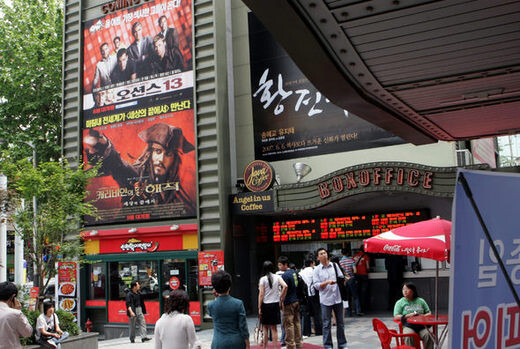hankyoreh
Links to other country sites 다른 나라 사이트 링크
Korean films set to be clobbered by Hollywood this summer

Hollywood films are sweeping the Korean cinema scene as domestic movies are losing their audience pull after a surprise boom last year.
Spider-Man 3, which premiered on April 30 and Pirates of the Caribbean: At World’s End, released on May 23, were playing at 619 and 670 movie houses nationwide, respectively. These two films are taking up more than 70 percent of the nation’s 1,700 theaters, as the number of cinemas screening Spider-Man 3 during the first week of its release reached up to 819.
In contrast, Unstoppable Marriage, a domestic movie, was released by 290 movie houses on May 10, but with the release of Pirates of the Caribbean this figure decreased to 230. Director Lee Chang-dong’s Secret Sunshine, running in competition at the 60th Cannes Film Festival, was released at 260 cinemas on May 24. Hwang Jin Yi, a historical drama to be premiered on June 6, is expected to secure over 450 movie houses, but well less than the two foreign films.
Hollywood blockbusters are likely to sweep the domestic movie scene through this summer. Major movies such as Shrek The Third, Ocean’s Thirteen, Transformers, Harry Potter And The Order of The Phoenix, and Live Free Or Die Hard are set to be premiered during this period. In the summer of 2004, Korean movies, including My Mother the Mermaid, A Wacky Switch, and How to Keep My Love were defeated by foreign films like Shrek 2, Spider-Man 2, and Harry Potter And The Prisoner Of Azkaban, indicating that domestic movies may have a rough time this summer, as well.
Lee Sang-mu of CJ Entertainment said, "Some Korean films even are careful that their release won’t coincide with foreign blockbusters. Strong performance of foreign movies will continue through the release of ‘Harry Potter.’ "
The biggest problem is there are no strong standout domestic movies to compete with foreign blockbusters. According to Lee Won-u, an official of film distributor Cinema Service, "It was a rare case for domestic movies to be dramatically defeated by their foreign counterparts during the summer season until now, but there is no leading title this year like ‘The Host,’ as in last summer.
The Korean movie industry set a record by producing over 100 films last year, and there were several successful titles such as Hanbando, The Host, 200-pound Beauty, and Maundy Thursday [sic]. However, as filmmakers competed to make movies, marketing expenses skyrocketed, lowering profitability. As a result, producers are now hesitant to give the go-ahead on new projects, and have balked at making any new investments from the beginning of this year. Only two major blockbuster-style films - both historical dramas - were made this year so far, Hwang Jin Yi and May 18. Hwan Jin Yi is about the title character, a talented
Experts mention the lack of new subject matter and diversified genres as another reason for domestic movies’ defeat. Films released this year included many conventional ones for the Korean film scene - gangster or crime dramas, family stories, and comedies, such as My Son, Mr. Lee vs Mr. Lee, Master Kims [sic], The Show Must Go On, and Meet Mr. Daddy.
Shim Hui-jang, marketing director of iFilm, a film production company, said, "Even if the taste of audiences has changed, most [Korean] movies released in the early part of this year just looked like copies of those produced previously."
Merely trying to use star power is also not piquing the interest of Korean moviegoers, observers of the film industry said.
Others blamed the poor performance of the Korean film industry on a reliance on the popularity of Korean cultural products outside of the country but particularly in the rest of Asia, a phenomenon called the ‘Korean Wave’ or
Please direct questions or comments to [englishhani@hani.co.kr]
Editorial・opinion
![[Column] Season 2 of special prosecutor probe may be coming to Korea soon [Column] Season 2 of special prosecutor probe may be coming to Korea soon](https://flexible.img.hani.co.kr/flexible/normal/500/300/imgdb/original/2024/0426/3317141030699447.jpg) [Column] Season 2 of special prosecutor probe may be coming to Korea soon
[Column] Season 2 of special prosecutor probe may be coming to Korea soon![[Column] Park Geun-hye déjà vu in Yoon Suk-yeol [Column] Park Geun-hye déjà vu in Yoon Suk-yeol](https://flexible.img.hani.co.kr/flexible/normal/500/300/imgdb/original/2024/0424/651713945113788.jpg) [Column] Park Geun-hye déjà vu in Yoon Suk-yeol
[Column] Park Geun-hye déjà vu in Yoon Suk-yeol- [Editorial] New weight of N. Korea’s nuclear threats makes dialogue all the more urgent
- [Guest essay] The real reason Korea’s new right wants to dub Rhee a founding father
- [Column] ‘Choson’: Is it time we start referring to N. Korea in its own terms?
- [Editorial] Japan’s rewriting of history with Korea has gone too far
- [Column] The president’s questionable capacity for dialogue
- [Column] Are chaebol firms just pizza pies for families to divvy up as they please?
- [Column] Has Korea, too, crossed the Rubicon on China?
- [Correspondent’s column] In Japan’s alliance with US, echoes of its past alliances with UK
Most viewed articles
- 1Samsung subcontractor worker commits suicide from work stress
- 2Division commander ordered troops to enter raging flood waters before Marine died, survivor says
- 3‘We must say no’: Seoul defense chief on Korean, USFK involvement in hypothetical Taiwan crisis
- 4No good, very bad game for Korea puts it out of Olympics for first time since 1988
- 5[Column] Season 2 of special prosecutor probe may be coming to Korea soon
- 6[Editorial] Korea’s surprise Q1 growth requires objective assessment, not blind fanfare
- 7Korea’s 1.3% growth in Q1 signals ‘textbook’ return to growth, says government
- 8US overtakes China as Korea’s top export market, prompting trade sanction jitters
- 9[Column] Has Korea, too, crossed the Rubicon on China?
- 1046% of cases of violence against women in Korea perpetrated by intimate partner, study finds